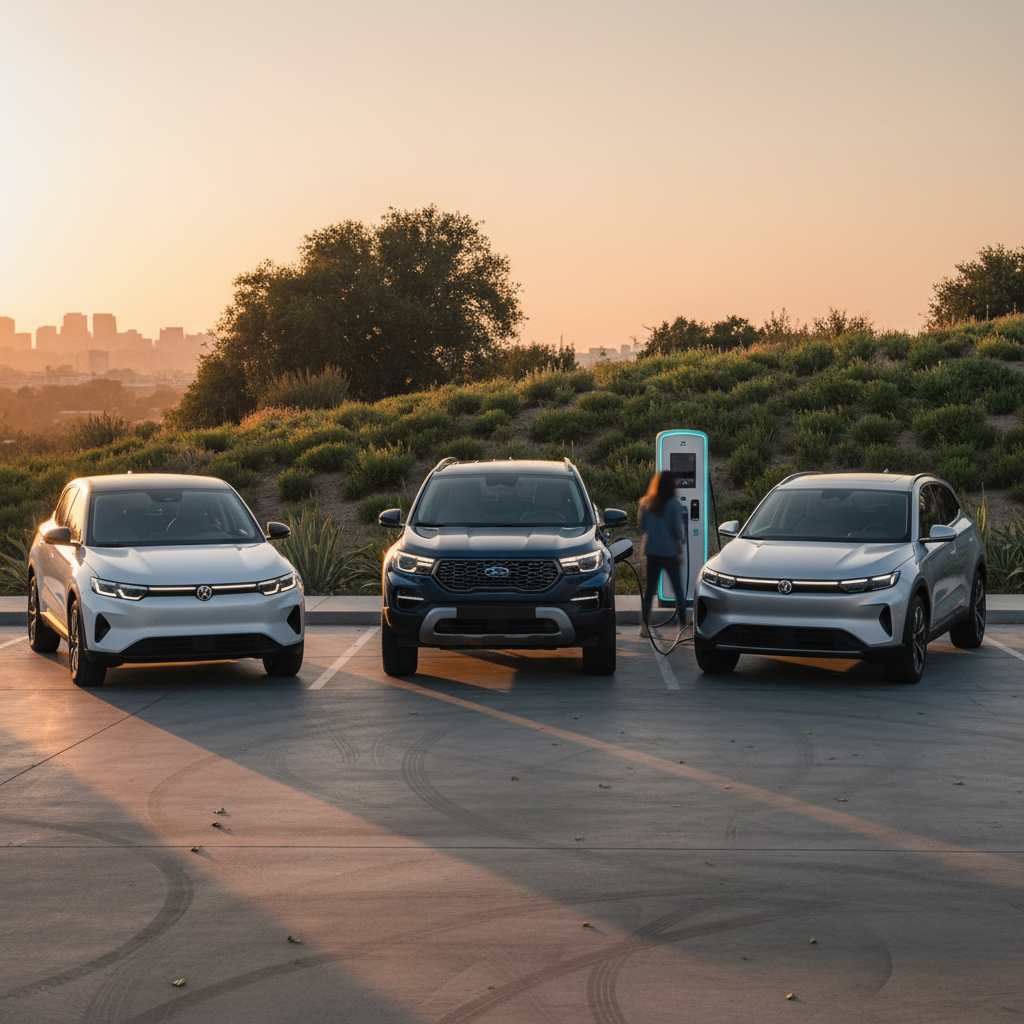Are electric cars more expensive than gas cars? On the window sticker, yes, most new EVs still carry a higher price than their gasoline twins in 2025. But once you factor in fuel, maintenance, incentives, and resale value, the answer gets messier, and in many cases it quietly flips from “more expensive” to “actually cheaper.”
The question behind the question
EVs vs gas cars: the short answer
EV vs gas: big-picture cost signals (2024–2025)
In 2025, the honest answer looks like this: most new EVs are still more expensive to own than gas cars overall, but a large and growing minority are now cheaper, especially when you can stack tax credits or buy lightly used. Fuel and maintenance clearly favor EVs; purchase price and depreciation still favor gas.
Location matters a lot
Purchase price: are electric cars still more expensive?
Start with the painful part: yes, new electric cars are still more expensive than gas cars on average. Recent market data puts the average new EV in the high-$50,000 range, roughly $9,000 more than the average gas car. The gap has narrowed as EV prices fell from 2022 peaks and discounts got aggressive, but it hasn’t vanished.
Why new EVs cost more up front
- Battery packs are still the single most expensive component in the car.
- Many EVs are high-spec trims loaded with tech, bumping the base price.
- Automakers are still recouping development costs and haven’t reached full scale in every segment.
What’s pushing prices down
- Intense price cuts (Tesla led the charge, others followed).
- More mainstream EVs (compact crossovers, sedans) instead of just luxury models.
- Competition and softening demand forcing better deals, leases, and rebates.
Don’t judge EV pricing by luxury models
Fuel costs: electric vs gas per mile
This is where EVs punch hard. Electricity in the U.S. averages under 20 cents per kWh; most mainstream EVs travel 3–4 miles on that kWh. Even with today’s somewhat softer fuel prices, an EV typically costs the equivalent of about $1.25 per “e‑gallon” versus $3–$4 for gas. Over normal American mileage, that’s not pocket change, it’s a mortgage payment or two.
Illustrative monthly fuel costs: EV vs gas (U.S. averages)
Approximate fuel costs for a typical commuter driving 1,000 miles per month. Your real numbers depend on electricity and gasoline prices where you live.
| Vehicle type / scenario | Energy use assumption | Monthly fuel cost (1,000 miles) | Annual fuel cost (12,000 miles) |
|---|---|---|---|
| Mainstream EV, home charging | 3.3 mi/kWh @ $0.17/kWh | $50–$60 | $600–$720 |
| Efficient hybrid sedan | 50 mpg @ $3.25/gal | $65 | $780 |
| Typical gas compact SUV | 30 mpg @ $3.25/gal | $108 | $1,296 |
| Truck or large SUV | 20 mpg @ $3.25/gal | $162 | $1,944 |
| EV using DC fast charging a lot | Higher rates & fees | Can approach gas costs | Can approach gas costs |
Fuel is the one line item where EVs routinely beat gas cars by a wide margin, especially if you can charge at home on off‑peak rates.
Fast charging can kill the savings
Maintenance and repairs: where EVs are cheaper (and where they’re not)
EVs are basically rolling laptops on skateboard batteries. From a maintenance standpoint, that’s mostly good news: fewer moving parts, fewer fluids, fewer wear items. No oil changes, no spark plugs, no timing belt, no exhaust, and no complex multi‑gear transmission. Over a several‑year ownership window, that usually translates into much lower routine maintenance costs than a gas car.
Maintenance: what you skip, what you still pay for
Think of EVs as skipping most “engine stuff” but still needing the “car stuff.”
What EVs skip
- Engine oil & filters
- Spark plugs, ignition parts
- Exhaust & emissions repairs
- Transmission fluid & complex gearboxes
What both still need
- Tires (often more often on EVs)
- Brake fluid & coolant service
- Suspension & steering repairs
- Cabin filters, wipers, bulbs
Where EVs can be pricier
- Collision repairs near the battery
- High‑voltage component work
- Specialized labor rates at some shops
Real‑world maintenance pattern
The scary monster in every EV conversation is the battery pack. Replacement costs can still run into the five figures, and that’s enough to keep second and third owners up at night. The counterweight is that most modern EVs carry 8‑year or 100,000‑mile battery warranties, and real‑world data so far suggests pack failures are rarer than early hand‑wringing predicted. For a typical first owner, catastrophic battery failure is unlikely during the finance term.
Insurance, taxes, and fees
Here, EVs don’t get a free ride. In many parts of the U.S., insurance is a bit higher for EVs because the cars are more expensive to replace and repairs can require specialized labor. Some states also tack on extra annual fees for EV registrations to make up for lost gas-tax revenue.
- Insurance: often slightly higher for an EV than a directly comparable gas car, mainly because of higher vehicle value and some pricier repairs.
- Registration: many states add an EV fee, often $100–$250 per year, to replace gas tax revenue.
- Emissions testing: EVs usually skip smog checks entirely, saving both time and money.
- Local perks: some cities and utilities offer discounted parking, toll breaks, or cheap off‑peak charging that quietly offset those higher fees.
Don’t ignore line‑items that are boring but real
Depreciation and resale value: the EV wild card
Depreciation, the silent assassin of car budgets, is where EVs have taken it on the chin. A wave of price cuts, rapid tech improvement, and anxiety about future battery longevity have combined to push down used EV values faster than many gas equivalents in the last couple of years.
Recent ownership‑cost studies show that while fuel and maintenance clearly favor EVs, depreciation often tilts the total‑cost math back toward gas, especially for mainstream, non‑luxury models. Luxury EVs sometimes fare better because their gas counterparts also depreciate brutally.
“The good news for used‑car shoppers is the bad news for first owners: many late‑model EVs have already taken their biggest value hit before you ever see them on a retail lot.”
Depreciation is bad for the first owner, great for the second
Tax credits and incentives in 2025
In 2025, federal EV incentives in the U.S. are still very real, but narrower and more complicated than a few years ago. Up to $7,500 in federal credits are available on eligible new EVs that meet battery‑component, final‑assembly, price, and income rules. The list of qualifying models is shorter than it was in 2024, but it still includes a mix of mainstream and premium vehicles.
Key ways incentives change the math
Stack the right credits and the “expensive” EV suddenly isn’t.
Federal tax credit
State & local perks
Leasing loopholes
Always price the EV twice
Used EVs vs used gas cars: where the math flips

If new‑car economics are a bit of a toss‑up, used EVs are where things get interesting. Because many electric cars have depreciated quickly, the used EV market is full of low‑mileage, late‑model vehicles listed for less than you’d expect given their original sticker prices. Meanwhile, many gas cars, especially reliable, efficient ones, have held value stubbornly well.
Why used EVs can be a bargain
- First owner already ate the biggest depreciation hit.
- You still get years of battery warranty coverage on many 2–5‑year‑old EVs.
- Running costs (fuel + maintenance) are still dramatically lower than a comparable gas car.
Risks to watch for
- Battery health varies: lots of fast‑charging or high mileage can mean more degradation.
- Future resale value is hard to predict as new tech arrives.
- Some early models have shorter range than today’s crop, which matters if you road‑trip.
Where Recharged fits in
How to run the numbers for your own drive
Whether electric cars are more expensive than gas cars for you comes down to how, where, and how long you drive. The right way to answer it isn’t with slogans, it’s with a simple back‑of‑the‑envelope model that captures your real life.
DIY total‑cost comparison: EV vs gas
1. Decide how long you’ll keep the car
Are you a 3‑year lease person or a 10‑year “drive it into the ground” person? The longer you own, the more fuel and maintenance savings matter, and the less scary depreciation becomes, because you’ve used the car longer.
2. Estimate your yearly miles
Grab last year’s odometer readings or fuel receipts and be honest. A high‑mileage commuter will benefit far more from an EV’s cheap energy than someone who drives 6,000 miles a year.
3. Plug in local fuel and electricity prices
Use your actual utility rate and local gas price, not national averages. Then estimate monthly cost for each car: (miles per month ÷ mpg) × gas price vs. (miles per month ÷ mi/kWh) × electricity price.
4. Get real insurance quotes for both cars
Don’t guess. Ask your insurer for quotes on the specific EV and gas model you’re cross‑shopping. Fold that into your monthly cost comparison.
5. Account for incentives, fees, and taxes
Subtract any federal, state, and utility incentives you can actually claim from the EV’s price. Add EV registration fees if your state charges them. Compare the “all‑in” upfront hit, not just MSRP.
6. Don’t forget resale or payoff
If you tend to trade in every few years, consider how sensitive you are to depreciation. If you tend to keep cars to the bitter end, focus more on ongoing fuel and upkeep.
If you want help with the math
FAQ: are electric cars more expensive than gas cars?
Frequently asked questions about EV vs gas costs
Bottom line: are electric cars more expensive than gas cars?
If you only look at the sticker, electric cars are still more expensive than gas cars for most shoppers in 2025. But cars are not sneakers; you don’t throw them away after a season. Once you factor in years of cheaper fuel, lower routine maintenance, and the right mix of incentives, many EVs end up roughly cost‑neutral with comparable gas cars, and a growing number are outright cheaper to own.
The trick is to stop arguing in the abstract and run the numbers for the specific cars and the specific life you live: your commute, your local energy prices, your incentives, your appetite for risk. That’s where the truth lives, and it isn’t the same for everyone.
If you’re EV‑curious but wary of overpaying, a well‑chosen used electric vehicle with verified battery health can be the sweet spot, modern tech, low running costs, and someone else’s depreciation. That’s the corner of the market Recharged specializes in, with financing, trade‑in options, nationwide delivery, and expert EV guidance to help you pick the car that’s not just greener, but smarter for your wallet.



